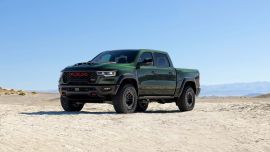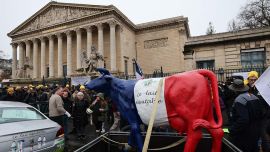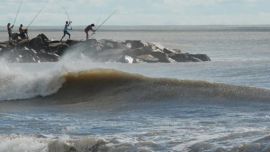The deepening coronavirus crisis sent stocks into another alarming slide on Wall Street on Thursday, triggering a brief, automatic shutdown in trading for the second time this week.
The Dow Jones Industrial Average was down about 1,800 points, or nearly 8 percent, at mid-morning, while the broader S&P 500 was off 6.2 percent, amid a cascade of cancellations and shutdowns across the globe and rising worries that the White House and other authorities around the world can’t or won’t help the weakening economy any time soon.
Trading was halted for 15 minutes after a big sell-off at the opening bell tripped the so-called circuit breakers that were first adopted after the 1987 crash. Until this week, they hadn't been activated since 1997.
A drop on Wednesday sent the Dow into what is known as a bear market for the first time in more than a decade when the index lost more than 20 percent from its all-time high just last month, bringing to a close one of the longest bull runs in Wall Street history. The S&P 500 was dangerously close to entering bear market territory, too.
The latest sell-off came after President Donald Trump announced late Wednesday he would restrict travel to the US from Europe in hopes of containing the virus, dealing another hit to the already battered airline and travel industries. Trump also outlined measures to extend financial help to individuals and businesses hurt by the crisis.
But “the market judgment on that announcement is that it’s too little too late,” said Michael McCarthy of CMC Markets.
Strategists at Morgan Stanley said in a report Wednesday night that conditions have gotten bad enough to prod a deeply divided Washington to act, but “we think action may not be imminent and are unsure it will be sufficient."
'This is bad'
“This is bad. The worst and fastest stock market correction in our career," Chris Rupkey, chief financial economist at MUFG Union, said in a research overnight. "The economy is doomed to recession if the country stops working and takes the next 30 days off. The stock market knows it. Bet on it.”
The Dow at midmorning was at 21,852, its lowest point since late December 2018, when investors were worried a recession was on the way because of rising interest rates and Trump's trade wars.
It was still higher than it was on the day of Trump's inauguration in 2017, when it closed at 19,827.
The damage was worldwide and eye-popping. Among the big moves:
— Travel stocks again were among the hardest hit. Norwegian Cruise Line lost more than a quarter of its value, and Royal Caribbean Cruises fell 23.6 percent.
— Oil continued its brutal week, with benchmark U.S. down to less than US $31 per barrel.
— European stocks tumbled 9 percent, even after the European Central Bank pledged to buy more bonds and offer more help for the economy.
— In Asia, stocks in Thailand and the Philippines fell so fast that trading was temporarily halted. Japan’s Nikkei 225 sank 4.4 percent to its lowest close in four years, and South Korea’s market lost 3.9 percent.
— US Treasury yields, which were one of the first markets to sound the alarm on the economic risks of the virus, fell further in an indication of more fear in the market.
by Stan Choe, Associated Press



















Comments